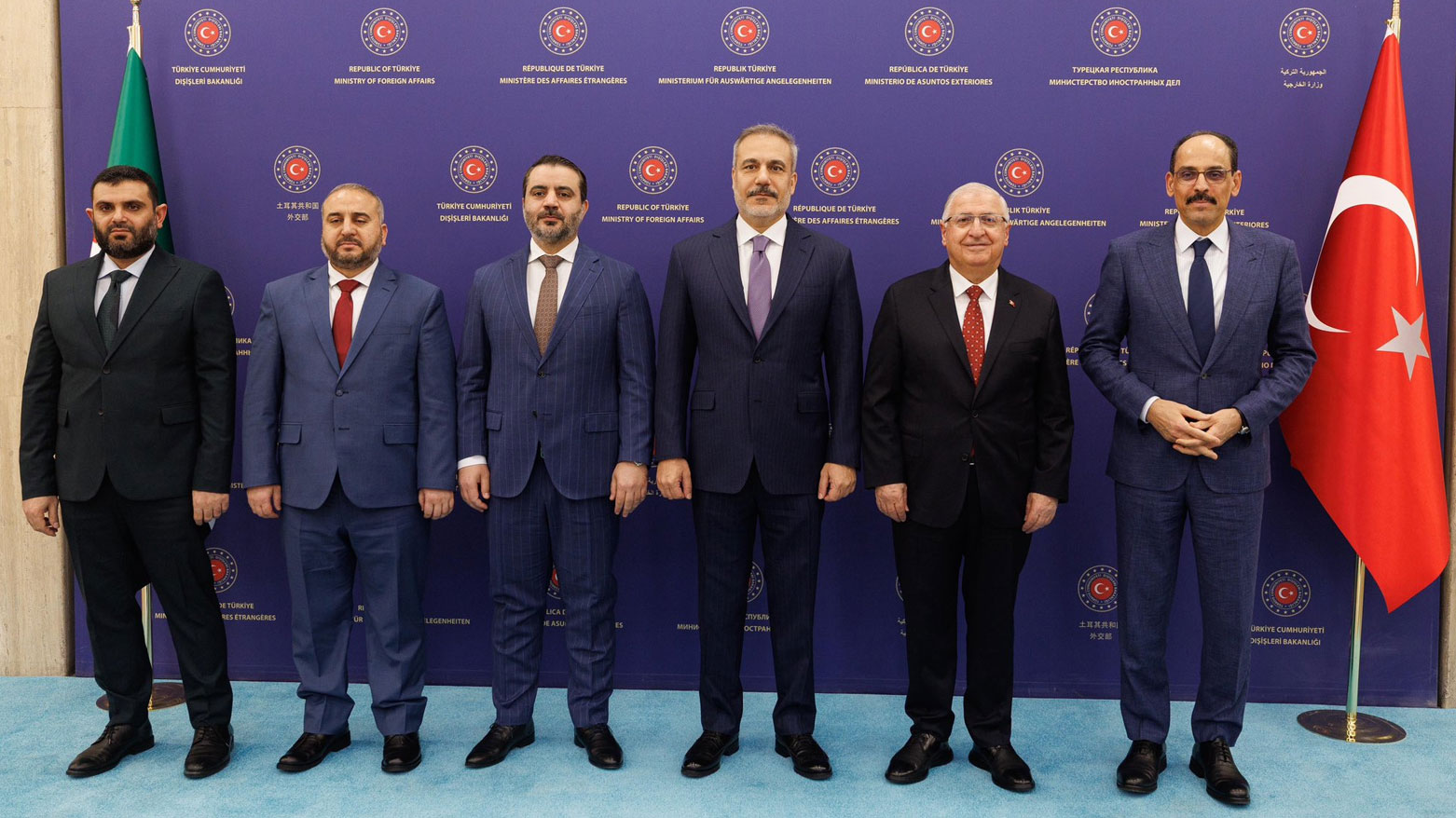Türkiye's FM: Syria's Security is Inseparable From Our Own
Türkiye and Syria's top officials met in Ankara, with foreign, defense, and intelligence chiefs agreeing to comprehensive cooperation on border security and counter-terrorism, signaling a profound diplomatic thaw.

Erbil (Kurdistan24) – In a development signaling the deepening rapprochement between Ankara and Damascus, Turkish Foreign Minister Hakan Fidan on Sunday announced that Türkiye and Syria are maintaining “comprehensive contacts at all levels and in every field,” following what he described as “the Syrian people’s attainment of freedom.” His statement came after high-level talks in the Turkish capital involving the foreign, defense, and intelligence chiefs of both countries — the first such meeting since formal channels of communication between the two governments were restored earlier this year.
In a post on his official X account, Fidan declared that “Türkiye and Syria are in agreement on the need to further strengthen coordination and cooperation to preserve and advance Syria’s gains.” He emphasized that the meetings in Ankara had allowed both sides to address “all aspects of the strategic dimensions of our relations,” and to discuss joint steps toward “ensuring Syria’s full security while preserving its territorial integrity.”
Fidan stated that Ankara views Syria’s security as inseparable from Türkiye’s, and reaffirmed that Türkiye would “continue to provide all forms of support to our Syrian brothers” as both sides pursue stabilization. “The Syrian administration possesses the determination and resolve to overcome the challenging trials it faces,” he said, asserting that Türkiye’s engagement with Damascus now extends across political, military, and intelligence domains.
The visit followed an announcement by Syria’s Ministry of Foreign Affairs and Expatriates, which confirmed that a senior government delegation led by Foreign Minister Asaad Hassan al-Shaibani, Defense Minister General Marhaf Abu Qasra, and Intelligence Chief Hussein al-Salamah had traveled to Ankara for discussions on joint counterterrorism measures, border control, stability, and military cooperation.
In a statement on his personal X account, Syrian Defense Minister Marhaf Abu Qasra expressed his appreciation for the “warm hospitality” extended by his Turkish counterpart, Defense Minister Yasar Güler, and acknowledged the “tangible efforts” made by Ankara to support the reconstruction of the Syrian Arab Army. He also thanked Turkish intelligence chief Ibrahim Kalin and Foreign Minister Hakan Fidan for their “sincere and effective participation in strengthening mutual understanding.”
“Our meeting today marks a new and important milestone in enhancing cooperation and coordination between the Syrian and Turkish armies, serving the interests of both nations and contributing to the consolidation of security and stability in the region,” Abu Qasra wrote.
The talks come amid a series of forceful remarks from Türkiye’s Defense Minister Yasar Güler, who reiterated that Ankara “will not allow any terrorist organization to operate in the territory of our neighbors under any name.” Speaking during military exercises in Ankara on Saturday, Güler specifically referred to the Kurdistan Workers’ Party (PKK) and the Syrian Democratic Forces (SDF), which Ankara regards as its Syrian branch.
Güler urged all armed groups linked to the PKK to “lay down their weapons immediately and unconditionally,” adding that Türkiye would never permit them “to take root or act under different designations” in Syria or elsewhere. He stressed that this stance aligns with the call made by Abdullah Öcalan, the imprisoned PKK founder, for the dissolution of the organization’s armed structures.
The Ankara talks coincide with major shifts inside Syria, where Mazloum Abdi, General Commander of the Syrian Democratic Forces (SDF), recently confirmed that his forces and the Syrian Army have reached a preliminary understanding on future integration and the establishment of joint security mechanisms. Abdi revealed that this progress followed his separate meetings in Damascus with the Syrian Defense Minister and Intelligence Chief, the same officials who later attended the Ankara talks.
Abdi described the Damascus discussions as “a comprehensive agreement on a nationwide ceasefire” and said they had opened the way for continued dialogue on military and administrative matters, including decentralization and the constitutional recognition of Kurdish rights. He confirmed that both sides had initiated “the first stage of understanding” to integrate the SDF and the Internal Security Forces (Asayish) into Syria’s Defense and Interior Ministries, with a joint military committee preparing to travel to the capital to finalize technical arrangements.
Crucially, Abdi also disclosed that the United States had proposed forming a joint Syrian–SDF force to combat ISIS, a plan both sides have accepted. He emphasized that this step aims to expand the fight against ISIS into a “national campaign” and that Damascus could soon join the mission, which he said could also facilitate the lifting of sanctions imposed on Syria.
Toward a New Security Architecture
While Ankara continues to regard the SDF with suspicion, the renewed Turkish–Syrian dialogue now overlaps with Washington’s attempt to reshape Syria’s post-war landscape through coordinated anti-ISIS operations and constitutional reform. Fidan’s declaration that “Syria’s security is inseparable from Türkiye’s” hints at Ankara’s evolving approach—one that seeks to stabilize its southern borders through cooperation rather than confrontation, while maintaining a firm line against Kurdish autonomy.
Meanwhile, Mazloum Abdi’s remarks suggest that the SDF–Damascus channel, though independent, may intersect with Türkiye’s security calculus, particularly as Damascus seeks to rebuild its army and reintegrate northern territories under a decentralized system.
The overlapping engagements — Ankara’s coordination with Damascus, the U.S.-mediated SDF–Army integration talks, and regional counterterrorism efforts — represent the most comprehensive reconfiguration of Syrian-Turkish relations since the outbreak of the Syrian conflict in 2011.
As both sides signal readiness to deepen cooperation, the convergence of military, intelligence, and political tracks marks a pivotal moment that could redefine the balance of power in northern Syria (Western Kurdistan), with Ankara, Damascus, and Washington each pursuing parallel but intersecting strategies to secure their interests.